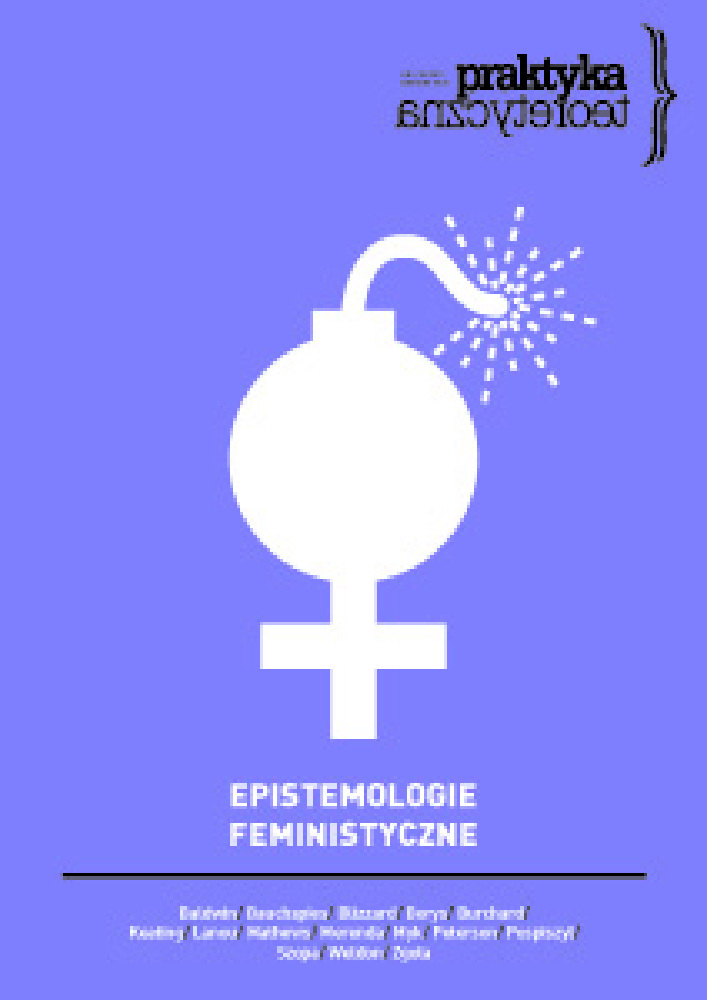Abstrakt
Badaczki feministyczne z krajów rozwijających się przez długi czas
pisały o napięciu między feminizmami Zachodnimi a feminizmami krajów
rozwijających się. Zachodnie feministki często przedstawiają kobiety z krajów
rozwijających jako poddaną opresji monolityczną grupę z „trzeciego świata”.
W niniejszym artykule zakładam, że władza zakorzeniona w tego rodzaju przedstawieniach niejawnie kategoryzuje kobiety ze świata rozwijającego się jako „inne” i tym samym umożliwia zachodnim feminizmom określanie, czyja wiedza jest odpowiednia w kontekście rozwijania feministycznej epistemologii. Podkreślam również, że dla rozwoju nauki feministycznej konieczne jest uznanie, że feministki z każdego zakątka świata posiadają wiedzę i doświadczenie, które powinny być postrzegane jako wartościowy wkład w feminizm. W swoim artykule stawiam pytanie o to, czy może dojść do zmiany w sposobach wytwarzania wiedzy feministycznej, zmiany umożliwiającej przekroczenie obecnych ograniczeń i wprowadzenie solidarności w praktyki feministyczne.
Bibliografia
Alarcon, N. 1990. ,,The Theoretical Subjects of This Bridge Called My Back and Anglo-American Feminism” In: Making Face, Making Soul: Haciendo Caras, ed. G. Anzaldúa. San Francisco.
Alarcon, N. 1994. ,,The theoretical subjects of this bridge called my back and Anglo-American feminism.” In: The postmodern turn, ed. S. Seidman. Cambridge.
Ang, I. 2001. I'm a Feminist but . . . ‘Other’: Women and Postnational Identities, in: On Not Speaking Chinese: Living Between Asia and the West. London.
Baksh-Soodeen, R. 1993. ,,Is There an International Feminism?” Alternative Approach 24: 22–32.
Brah, A., A. Phoenix 2004. ,,Ain’t I A Woman? Revisiting Intersectionality.” Journal of International Women’s Studies 3.
Crowley, E. 1991. ,,Third World Women and the Inadequacies of Western Feminism.” Trocaire Development Review 2 July.
Elshtain, J.B. 1982. ,,Feminist Discourse and its Discontents: Language, Power and Meaning.” Signs 3.
Felski, R. 2000. The Doxa of Difference, in: Doing Time: Feminist Theory and Postmodern Culture. New York.
Flax, J. 1990. ,,Postmodernism and Gender Relations in Feminist Theory.” in Feminism/Postmodernism Thinking Gender, ed. L. Nicholson. New York.
Gouws, A. 1996. ,,Feminist Epistemology and Representation: The Impact of Post-Mondernism and Post-Colonialism.” Transformation 30.
Kirby, V. 1993. ,,Feminisms and Postmodernisms: Anthropology and the Management of Difference.” Anthropological Quarterly 3.
Ksihwar, M. 1990. ,,Why I do not Call Myself a Feminist.” Manushi 61.
Lazreg, M. 1988. Feminism and Difference: The Perils of Writing as a Woman on Women in Algeria, Feminist Studies 1.
Lorde, A. 1984. Sister Outsider: Essays and Speeches, Trumansburg-NY.
Mohammed, P. 1998. ,,Towards Indigenous Feminist Theorizing in the Caribbean, in: Rethinking Caribbean Difference Historicizing Slavery/The Impact of the Global Environment/ Illusions of Development/Gendered Testimonies.” Feminist Review 59: 6–33.
Mohanty, Ch. 1984. ,,Under Western Eyes: Feminist Scholarship and Colonial Discourses” Boundary 2 3.
Mohanty, Ch. 2003. Feminism Without Borders: Decolonising Theory, Practicing Solidarity. Durham–London.
Mohanty, S.P. 1993. ,,The Epistemic Status of Cultural Identity: On Beloved and the Postcolonial Condition.” Cultural Critique 24.
Moraga, Ch., G. Andaldua, 1981. This Bridge Called My Back: Writings by Radical Women of Color. Watertown.
Nagel, M. 2004. ,,Chandra Talpade Mohanty. Review” Wagadu 1.
Reddock, R. 2001. ,,Conceptualizing ‘Difference’ in Caribbean Feminist Theory” in: New Caribbean Thought: A Reader, ed. B. Meeks, F. Lindahl. Kingston.
Somjee, G. 1989. Narrowing the Gender Gap. Basingstoke–London.
Spelman, E. 1988. Inessential Woman: Problems of Exclusion in Feminist Thought. Boston.
Talpade Mohanty, Ch. 2003. Feminism Without Borders: Decolonising Theory, Practicing Solidarity. Durham–London.
Talpade Mohanty, Ch. 2003. ,,Under Western Eyes Revisited: Feminist Solidarity Through Anti-capitalist Struggles.” Signs 2.
Tang Nain, G. 1991. ,,Black Women, Sexism, and Racism: Black or Antiracist Feminism?” Feminist Review 37: 1–22.
Yeatman, A. 1994. Postmodern Epistemological Politics and Social Science, in: Knowing the Difference, eds. K. Lennon, M. Whitford. New York.
Zimbalist Rosaldo, M. 1980. ,,The Use and Abuse of Anthropology: Reflections on Feminism and Cross-Cultural Understanding.” Signs 3.
Licencja
Autorzy:
„Praktyka Teoretyczna” jest pismem, które chce realizować idee wolnego dostępu do wiedzy i poszerzania domeny dobra wspólnego. Ma służyć rozwojowi nauki i krytycznej refleksji w Polsce i na świecie w imię idei wolnego dostępu do wiedzy (Open Access). Całe pismo jest udostępniane za darmo w Internecie na warunkach licencji CC-BY-NC-SA (Uznanie autorstwa-Użycie niekomercyjne-Na tych samych warunkach 4.0 Międzynarodowe) w wersji 4.0 (szczegółowe warunki: http://creativecommons.org/licenses/by-nc-sa/4.0/). Artykuły w nim zamieszczone mogą być dowolnie przechowywane, kopiowane, drukowane, rozpowszechniane i wykorzystywane do celów naukowo-dydaktycznych przy zachowaniu warunków licencji. Apelujemy tylko o uznanie autorstwa i podanie źródła w myśl przyjętych w środowisku naukowym standardów.
Nie ma natomiast możliwości komercyjnego wykorzystania zgromadzonych zasobów bez pisemnej zgody wydawcy. Dostęp do czasopisma nie może być dystrybuowany za opłatą czy w jakikolwiek inny sposób limitowany przez inne podmioty.
Autorzy tekstów przyjętych do publikacji w czasopiśmie „Praktyka Teoretyczna” są zobowiązani do wypełnienia, podpisania i odesłania na adres redakcji umowy o udzielenie nieodpłatnej licencji do utworów, z zobowiązaniem do udzielania sublicencji CC [PL.pdf, PL.doc, EN.pdf, EN.doc].
Zgodnie z umową, autorzy tekstów opublikowanych w czasopiśmie „Praktyka Teoretyczna” udzielają wydawcy czasopisma niewyłącznej i nieodpłatnej licencji oraz zezwalają na użycie sublicencji Creative Commons Uznanie autorstwa-Użycie niekomercyjne-Na tych samych warunkach 4.0 Międzynarodowe (CC-BY-NC-SA 4.0).
Autorzy zachowują prawa do dalszego, swobodnego rozporządzania utworem.
Autorzy nadsyłanych artykułów powinni upewnić się, czy wykorzystywane przez nich materiały nie są chronione prawami autorskimi na rzecz innych osób i ponoszą odpowiedzialność za ewentualne uchybienia w tym względzie.
